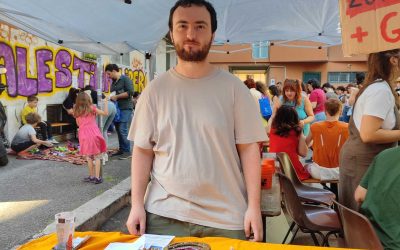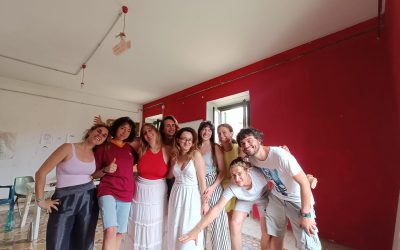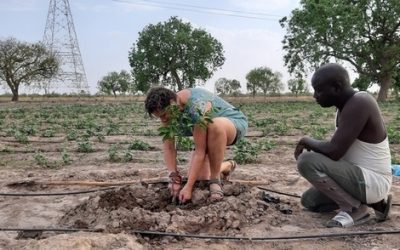Education
Workcamp in Kurdistan with refugees
The project took place in:
Turkey
Workcamp
Written by Helena Casas Perpinyà
Every morning we wake up in the Guest House. Roj bash! Our Kurdish partners have prepared the breakfast and we get together at the table while having a chat, laughing, about our linguistic differences. Heval, partner in Kurdish.
In Diyarbakir they are always willing to offer and share some tea with you. It is the hospitality of people who share their life; the community makes them stronger and more present. From the mosque they hear the prayer on time, but not everybody here is Muslim, not all of them speak Turkish, even though the State insists on making it very present. Last year there was a giant Turkish flag hanging on the castle of Diyarbakir and three weeks ago there were two of them: we must all know that we are still in Turkey.
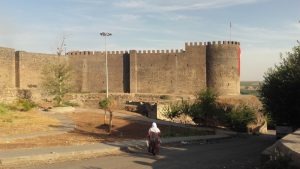
Despite all of this, the silence of the Kurds was broken some time ago:”During the coup it was the calmest period for us. In that time I thought that maybe this way the Turks could understand how we have been living day after day for so many years.“ explains Umut to us while we are walking through the streets of his town. In a small courtyard a group of old women sing out loud those Kurdish songs which unfortunately nowadays a lot of parents fear to teach to their sons and daughters.
A little Diyarbakir exists 20km to the south of the city.“Here life is not even life anymore“, tells us Semo in the camp. She has been living there for two years. We arrive there by bus and with their music, which can never be missing. They are always singing, and dancing is part of their life.
Spas, thank you; xêr hatìn, welcome. The refugee camp in Diyarbakir opened in 2014 as a transition camp, but now the borders are closed and around 1.300 people stay there without knowing for sure when they’ll be able to go, who knows if it would be to go back home or towards Europe. Semo, a 63-year old mother of 11 sons and daughters and many others, as she says, explains to us how they had to escape from Dugur. They had only one hour to pack their home in one baggage. They don’t have any documents anymore or money to imagine a future outside the camp. Fortunately, one of her sons managed to get to Germany, she tells us. They talk to each other on the phone occasionally.
The word Refugee turned into a distant one, each family has its own path and story. The park of 260.000 square meters, where people used to have their picnics before, hosts today those people who don’t have a recognized legal status, but everyone knows that they are there.
The majority of the people who arrive there are Yezidis from Iraq. They don’t forget: On their tent you can see writings with 3/8, in memory of the genocide carried out by ISIS in Sinjar, 3rd of August 2014. It is difficult to know how many arrive and how many leave. We are told that throughout the year there were about 17.000 people fleeing, but nobody can tell us where they were headed to. The everyday life passes by with a taste of stalled transition, their willing to go is determined, as well as the indifference of the Government regarding their lives.
There are questions which are difficult to answer. Women wear in violet colors, the colour of the Kurdish woman; they take care of the boys and girls and manage the food, the family and the memories:” During the day we seat down, we pray for them, for us, take care of our families and cook for everybody”. In the last two years only 4 marriages were celebrated in the camp. At this point, people try not to get too much involved in relationships: getting married would mean another death to cry for. It is not a matter of age, many of them are only waiting to die: “They have killed so many people that I am not afraid of it anymore”. She is 20 years old, lives in the city of Diyabakir and tells us the same as Semo.
The questions about the children are always the most difficult to answer. The camp of Diyarbakir is managed by the municipality and it is responsible for their maintenance: water and electricity are always supplied by the municipality, always a Kurdish community, whereas the food arrives thanks to the collaboration of the association Support of Live, which gives 45 Turkish Lira to every person per month.
The sanitarian assistance is precarious and is managed by volunteers, who cover shifts 5 days per week in a small wooden house at the camp. Education and Health are legally the government’s responsibility. The same government which shut down a Kurdish cartoon channel three weeks ago and newspapers seats, the same government which “accepts the Kurds only if we say that we are Turks”. And that is why kids haven’t had a school since last year and don’t count on a guaranteed sanitarian assistance anymore.
By the presence of 30 young foreigners the monotony of the camp gets broken, the boys and girls smile and squeeze out their four words in English. Some of them were born in the camp, others remember their home well and show it to us in their drawings.
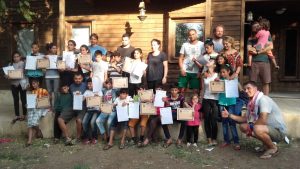
Jamal, 22 years old, teaches English three times a week. 200 kids attend his lessons, “but it is not enough: days go by and without a school nothing pulls them out of the stalled reality of the camp. “
Parents get closer, spas. The time in the camp seems to take on another rhythm, certainly because 10 days are not enough to get to know so many stories. Everybody asks us just one thing, always the same: Take our reality home with you, and make our story known, organize camps for the kids. They are still on time.
In Diyarbakir the sun goes down soon. At 6:30 pm we leave the camp and say goodbye to everybody. For them the sun brings the light that gives fruits to life. The green colour on their flag is the territory for which they fight and the red colour is the rebellion that keeps them standing.
For some of us this has been the first time in Diyarbakir, other had been there already before. In any case, we have learned that solidarity is what keeps us united with this people.
You can still join!
Want to have your own volunteer experience for peace?
Read more Voices of Volunteers

